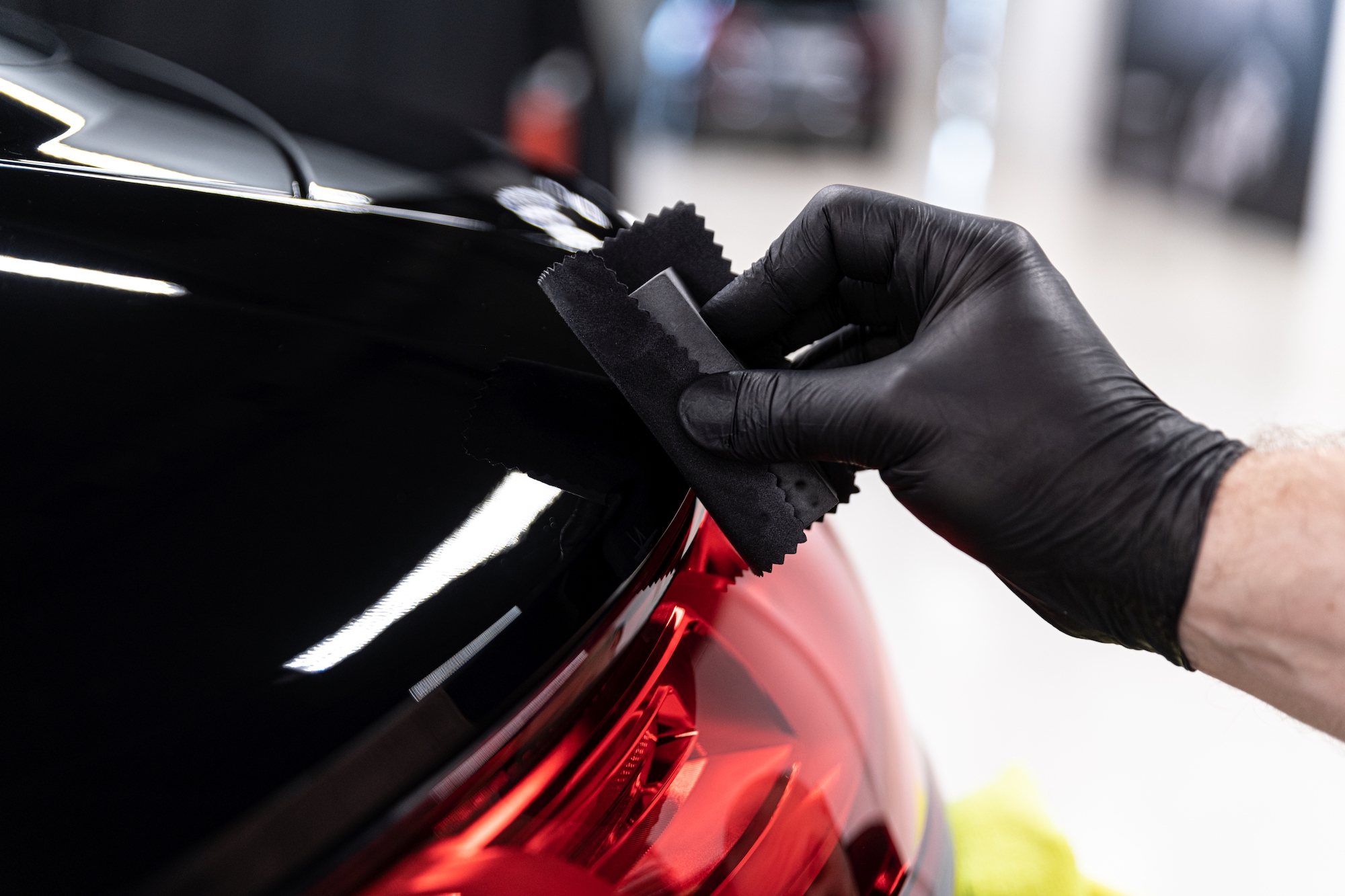2023 Nissan Rogue Review (Is 3 Cylinders Enough?)

The Nissan Rogue is a compact crossover utility vehicle with room for five. Every manufacturer offers at least one such model.
Nissan distinguishes the Rogue with its styling, amenities, and price. The company also avoids the hybrid bandwagon by powering every model with an efficient, yet potent three-cylinder engine.
2023 Nissan Rogue Review
Nissan offers the 2023 Rogue in five grades – S ($27,360), SV ($29,050), Midnight Edition ($33,245), SL ($33,710), and Platinum ($37,140). Front-wheel drive is standard; all-wheel drive is a $1,500 upgrade for all grades. Add $1,225 for the destination charge.
Our test model was a 2023 Nissan Rogue Platinum grade with all-wheel drive. It came with special two-tone paint ($325), illuminated kick plates ($400), external ground lighting ($620), and a special premium package that added tri-zone climate control, heated rear outboard seats, and a head-up display ($620).
All told, this model cost an eye-watering $43,100. That said, you can find well-equipped versions for about $10,000 less.
Exterior Remarks
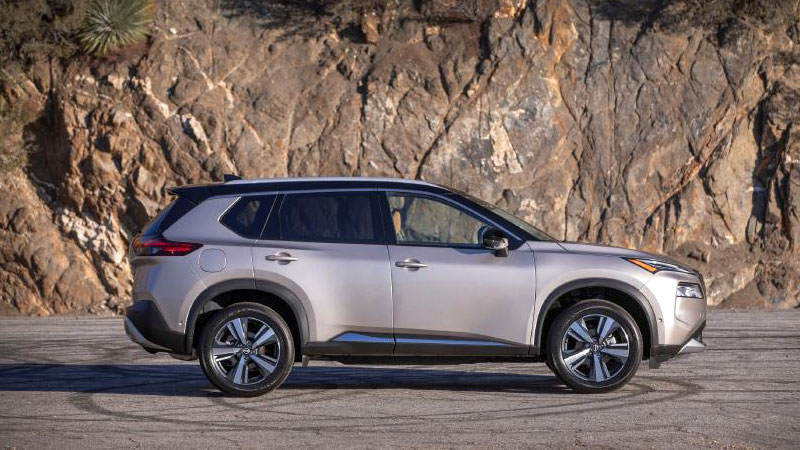
The Nissan Rogue delivers a strong presence and is easily confused with the midsize Nissan Pathfinder. That’s a good thing, although the front fascia is different from the Rogue.
Indeed, the most noticeable distinction between the two is the split headlights with the Rogue. It supplies an unusual appearance along with the familiar horse collar grille.
Strong shoulders, a high beltline, and a long roofline make the Rogue seem larger than it is. We were particularly enchanted by the two-tone paint and the floating roof design, a look that punches above this segment’s weight. The rear quarter is not as dramatic as the front with the usual wraparound tail lamps present.
Nissan equips the Rogue with automatic LED headlights, LED daytime running lights, and LED taillights. Front fog lights are available. Dual folding and power-adjustable side mirrors are standard and come heated on all but the base model.
The list of available features includes a power panoramic moonroof, roof rails with available fixed crossbars, and an available power liftgate.
The Rogue comes with standard 17- or available 18- or 19-inch aluminum alloy wheels. They are wrapped in all-season tires.
Interior Highlights
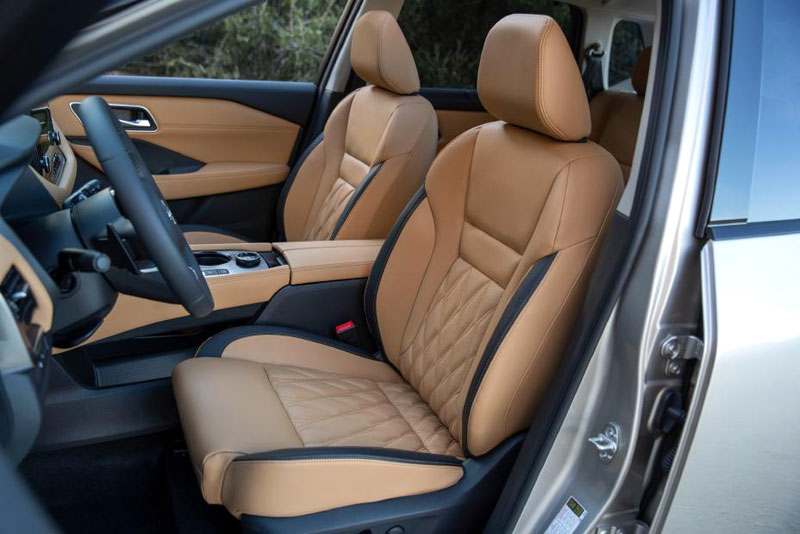
The current breed of compact utility vehicles belies their name. At least when it comes to interior space. Like most competitors, the Rogue seats five with ease although for a boost in comfort and rear hip room, the midsize Nissan Murano is the better and more expensive choice.
Unusual for this segment is the material choices covering the seats. Cloth seats come standard and imitation leather is available. Nissan also offers real hides, including quilted leather on the Platinum trim. The latter seems borrowed from Infiniti, Nissan’s luxury brand, and is found on the door inlays and dashboard too.
All but the base trim comes with power front seats. The front seats are especially comfortable and ideal for long trips. They’re heated on the two top trims.
Other features of note include dual-zone climate control on all but the base trim, four cupholders, and four drink holders. We like the Rogue’s nifty “divide-n-hide” cargo management system that keeps some cargo squirreled away while supplying access to what people need on the go.
The Rogue comes with standard 31.6 cubic feet of cargo space or a generous 74.1 cubic feet when the rear seat is folded. Those rear seats, by the way, recline slightly to enhance passenger comfort.
Technology Features
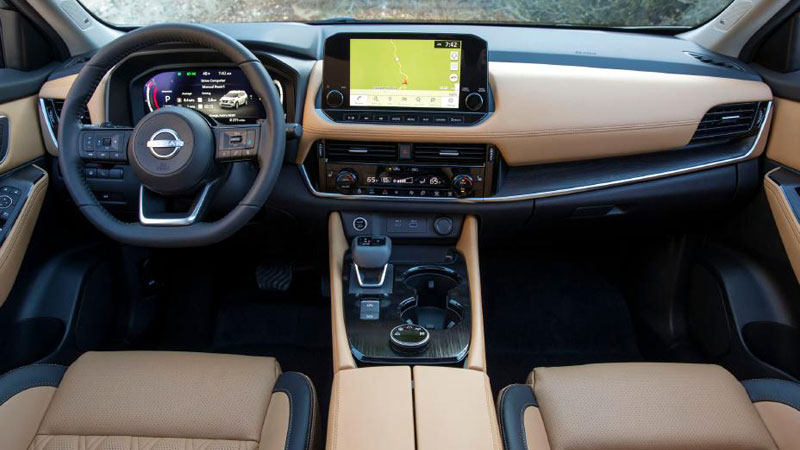
The Nissan Rogue comes with an 8-inch touchscreen display, Android Auto, Apple CarPlay, Bluetooth, and a four-speaker audio system with satellite radio. The SV and SL grade offers a six-speaker audio package, while the Platinum model has a 10-speaker Bose audio system.
Two USB ports come standard and are found in the front console. Beyond the base model, Nissan adds two additional USB ports for the rear seating compartment. Amazon Alexa and navigation are available.
Safety Features
Nearly every driver-assist safety feature is available across the model line. This means automatic emergency braking with pedestrian and cyclist detection is standard.
Nissan also includes forward collision warning, lane departure warning, lane intervention, blind spot warning, rear cross-traffic alert, and driver alertness. Standard with the Platinum trim and available with the SL is traffic sign recognition.
Nissan’s ProPilot Assist technology which combines adaptive cruise control with lane-centering assist is included beginning with the SV grade. This system incorporates elements of autonomous driving but is no substitute for driver engagement.
Powertrain Choices
Nissan’s previous naturally aspirated four-cylinder engine disappeared in 2022, one year after the new Rogue came out. The previous engine made an even 181 horsepower and 181 pound-feet of torque.
The new engine is a tiny 1.5-liter turbocharged three-cylinder. These bang out 201 horsepower and 225 pound-feet of torque, rivaling the power output of certain turbocharged four-cylinder engines, such as the one powering select Volkswagen and Audi models. Power routes to the front or all four wheels utilizing a continuously variable transmission.
The 2023 Rogue makes a very respectable EPA-estimated 30/37/33 mpg city/highway/combined with front-wheel drive or a combined 31 mpg with all-wheel drive.
Driving Highlights
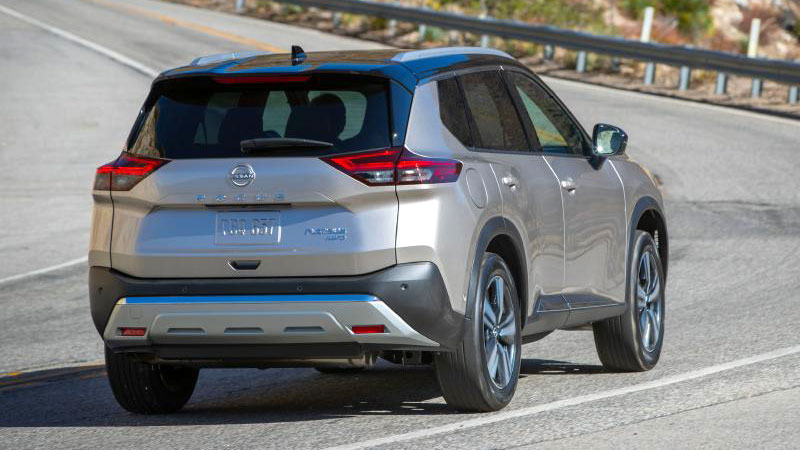
One of the smallest engines on the market powers the 2023 Nissan Rogue. That thought may give some drivers pause, especially if they’re considering vigorous driving or towing.
We took our test vehicle on an uncommonly long trip from central North Carolina to eastern Tennessee, navigating twisty roads and climbing above 6,000 feet at times. Not once did we feel the Rogue struggle even with a tiny 1.5-liter turbocharged three-cylinder engine paired with a continuously variable transmission on hand.
Increasingly stiff federal regulations are forcing manufacturers to improve fuel economy and sometimes with an unusual approach. Nissan found a creative way to develop this engine while avoiding the balance issues that once dogged these motors. Its lighter weight (than a four-cylinder engine) and turbo power combine to deliver an efficient, yet potent motor.
This engine works with a continuously variable transmission, common to all Nissan models equipped with small engines. If you’re not a fan of a CVT, we understand why – this gearless transmission relies on a pulley system and there are times when the engine revs race, particularly under hard acceleration.
But Nissan also utilizes software to drop the RPMs at certain times in the band curve, easing the engine’s whine and giving this model a more natural feel.
We were impressed by just how well the Rogue performed as we climbed ever higher on mountain roads. As semis moved to the right, we passed with ease on the left – the mighty engine kept delivering power and the CVT complied. There is some turbo lag evident.
We can imagine that the Rogue would behave differently with a full contingent of passengers onboard. We cannot imagine pulling anything with this vehicle, despite its modest 1,500-pound tow rating.
Steering feedback is minimal, while handling is decent. A comfortable ride and firm brakes are two attributes of note.
Nissan Rogue Considerations
The current Rogue surprised us with its small but potent engine. We believe that this utility vehicle can work quite well as a commuter vehicle, but wonder how it would do as a family hauler.
If you don’t need all-wheel drive, the Rogue SV costs about $30,000 and delivers a decent combination of amenities and value for the money.
Photos courtesy of Nissan.





